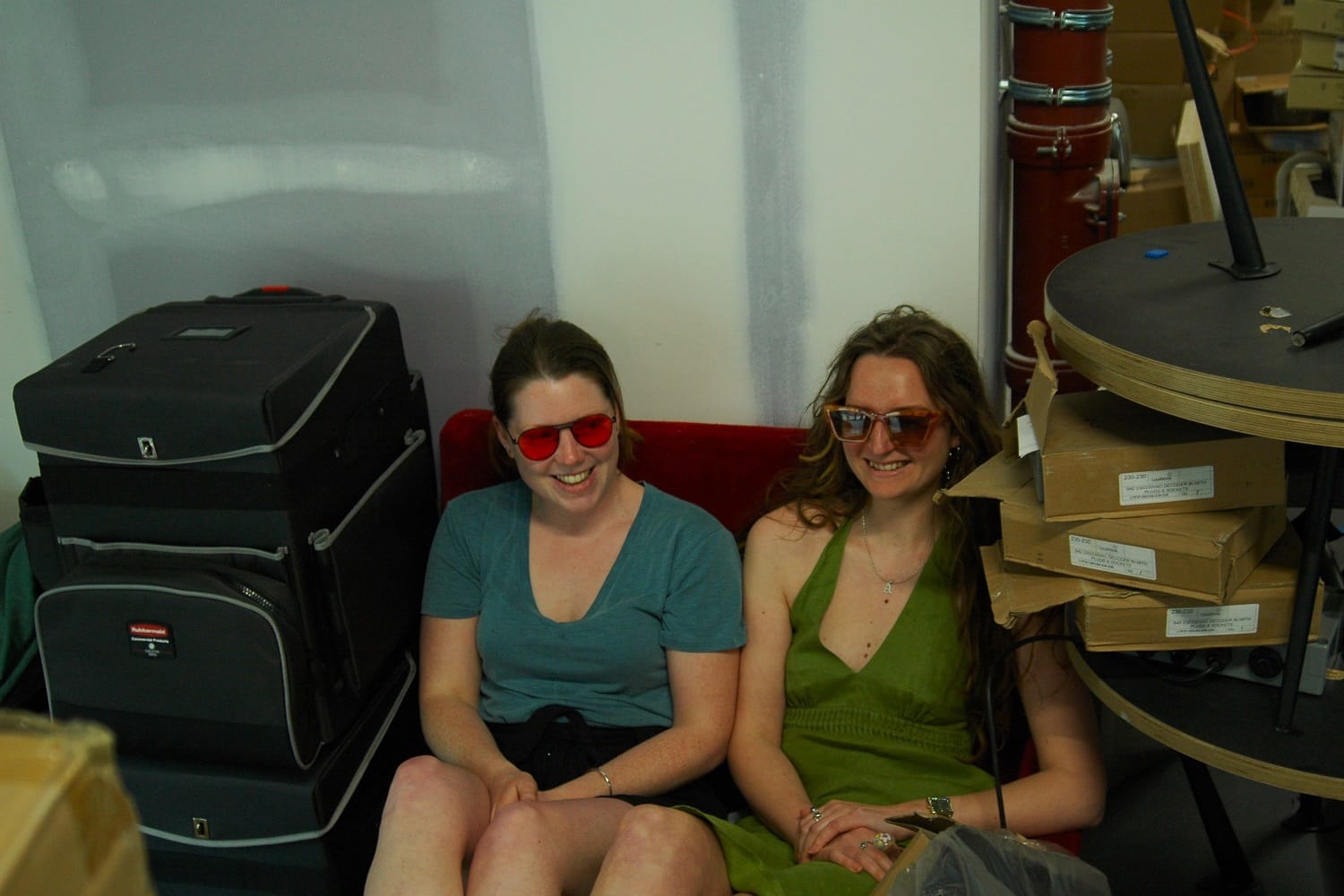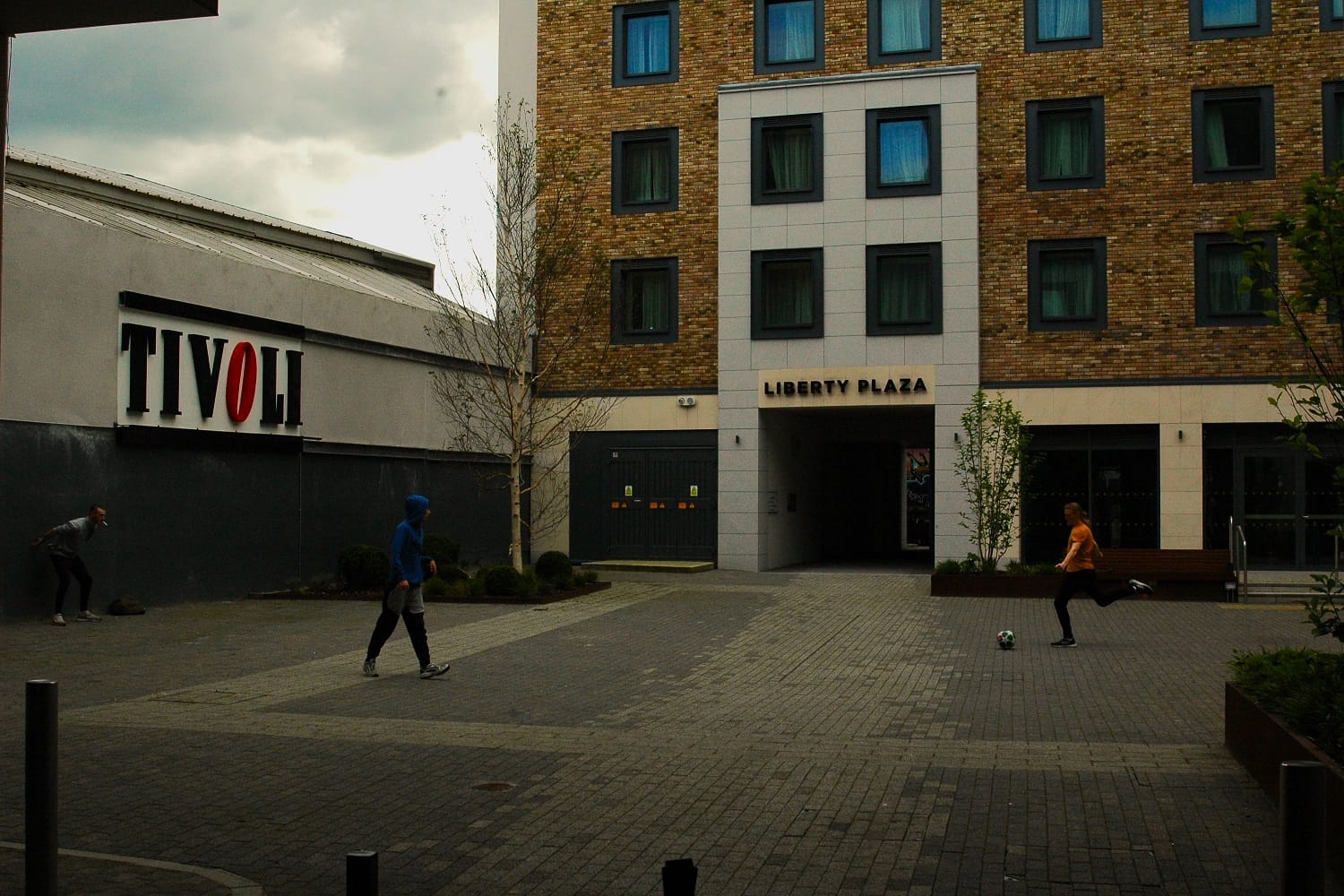What’s the best way to tell area residents about plans for a new asylum shelter nearby?
The government should tell communities directly about plans for new asylum shelters, some activists and politicians say.
“We have a proposal put together regarding the future use” of the space, said a spokesperson for the Staycity aparthotel, which opened in January 2022 and hosts it.

Below the salvaged sign of the former Tivoli Theatre, a young man stands in a half-crouch between two jumpers that are serving as goalposts.
A cigarette dangles at the end of his mouth as he stares forward, transfixed while a pair of his pals boot a starry football around the Tivoli Square off Francis Street.
It was a cloudy, but warm Monday afternoon in mid-May.
Occasionally, a member of staff in the Staycity aparthotel stepped out of the reception, where the Tivoli Theatre once stood. They pushed trolleys filled with bedclothing towards a nearby glassy room.
On the site map, fixed to a wall on the way into the square, the room is labelled as a “performance and exhibition space”. Although its present function is a tad more ambiguous.
The interior would suggest that it is acting as storage space. Wooden pallets are stacked with flatpack boxes, quilts in plastic wrapping and towels.
It is occasionally used as a cultural space though, a spokesperson for Staycity said.
Local students from the BIMM Institute are preparing to hold a graduation gig here on 9 June. The artists Eve Woods and Aoife Ward are planning an exhibition from late August to early September.
But that there are just two events, spread out across three months, raises the question of whether Staycity has addressed the loss of a cultural venue, as requested by Dublin City Council during the planning process.
While the aparthotel has been open for 16 months, plans for a cultural venue there remain in gestation.
“We have a proposal put together regarding the future use of the internal ground floor at our Tivoli property,” the Staycity spokesperson said. “But this is currently subject to planning approval.”
Eve Woods and Aoife Ward walk through the echoing ground-floor cultural space-to be, passing large plastic wheelie containers and the pallets bearing the weight of hotel supplies.
In a corner of the room, there is a dark red couch with a single armrest. It had been stowed away behind cardboard boxes, round tables stacked on top of each other, and a smiling Numatic Henry Hoover.
Originally, the couch had belonged to one of Dublin’s cinemas or theatres which no longer stands, says Woods. “Which one we don’t know, because there’ve been so many demolished or taken over.”
It may very well have been in the Tivoli Theatre, she says. “It’s just a relic that’s survived somehow.”

The seat was used as part of the artistic duo’s satirical walking tour of the Liberties, titled “A Cultural Tour of Hotels in the Liberties”, staged as part of Culture Night last September.
For the event, it was positioned in the middle of the space. Lit up by a single work light and propped up on a pair of breeze blocks, the ghostly remnant of a lost venue was titled “An Couch Pleanala”.
It was a direct jab at An Bord Pleanála, which accepted an appeal by the Tivoli Theatre’s former owner, Anthony Byrne, to demolish the venue and replace it with the aparthotel.
Anthony Byrne applied to Dublin City Council for permission to demolish the Tivoli Theatre in April 2017.
His proposal was to build a mixed-use development with a courtyard. Plans showed a ground-floor gym in place of what is now designated a performance and exhibition space.
This performance and exhibition space was first put forward as an idea by Byrne after the council requested he address the loss of the Tivoli Theatre without any replacement cultural facilities.
The Liberties Local Area Plan also said there should be cultural or community use on part of the site.
In response, Byrne adjusted the plan. He swapped in the performance space for the gym, and also proposed that the courtyard could host performances and film screenings.
Dublin City Council still refused to grant the project permission. But Byrne brought an appeal to An Bord Pleanála, and secured approval on 8 January 2018.
Global asset manager DWS bought the Tivoli Theatre site the following January.
DWS and Staycity developed the site in partnership, with Staycity taking a 25-year full repairing and insurance lease.
In January 2022, the aparthotel opened.

Over the following eight months, the performance and exhibition space was used for storage.
Then for Culture Night in September, Woods and Ward staged their walking tour of the hotels built around Dublin 8.
The blue wheelie containers were pushed to the side for the night, Ward says, as she and Woods walk around the interior. “We started outside and came in to explain the performance space.”
“It was explaining what an aparthotel is and the price per night,” she says.
Ward and Woods brought their audience then around the back of the performance space to see what remains of the graffiti that decorated the walls of the theatre’s car park, says Woods.
“And then we went to places like Michael Mallin Park where the plan is, what was used for sports, will be the plaza entrance of the Molyneux Yard hotel.”
A month later, the duo returned for a second similar event, bringing an audience into Tivoli Square to discuss the possible uses for the indoor space and how public space can sometimes appear private through the use of hostile architecture.
The latter was, in part, a nod to a planning application submitted the previous June by Cantarini Limited – a subsidiary of Staycity Limited – in which the company sought to erect a steel gate between Francis Street and the courtyard.
A Staycity spokesperson said at the time that the courtyard was still intended for public access, and that the gate was to deter anti-social behaviour at night.
But in July, the council refused permission. Deputy City Planning Officer Mary Conway said that the gate would have a significant and detrimental impact on the perceived level of visual connectivity and public access between the street, courtyard and cultural venues.
“These courtyard spaces and internal/external venues were provided to offset the loss of the Tivoli Theatre,” Conway said.
In February, when contacted for an update on the opening of the performance and exhibition space, a representative for Staycity said a proposal for its future use was being put together, subject to planning approval.
An application had not yet been submitted. But, the spokesperson said, it was to be expected “shortly”.
“As part of our plans for the courtyard, the space is currently being used by local artist Eve Woods as a multi-disciplinary visual art project involving walking tours with local art displayed,” the spokesperson said.
In the interim, the space was fulfilling its intended purpose on occasion, the spokesperson said, confirming that musicians in the BIMM Institute on Francis Street would be using the space for a live event on 9 June, while Woods and Ward were planning an exhibition there from 28 August until 8 September.
A long-term plan is still being developed, they said. “Our goal is to get works started this year.”
In July 2022, An Bord Pleanála’s director of corporate affairs, Gerard Egan, said that in its decision to grant permission, there wasn’t any specific deadline before which the developer had to create the cultural space.
“Matters of alleged non-compliance with the permission terms is an enforcement issue that is within the jurisdiction of the local planning authority, which in this case Dublin City Council,” Egan said at the time.
The council’s press spokesperson at the time said the conditions set out in a decision should be complied with within five years of the grant of planning permission.
Permission was granted on 8 January 2018, which would make the deadline 8 January 2023.
When asked about this deadline, the council’s press spokesperson pointed to condition 13 of An Bord Pleanála’s decision: “Prior to commencement of development, the developer shall submit in writing a proposal for the management of the outdoor performance area and public areas for the agreement of the planning authority.”
A detailed compliance submission was made in respect of the condition in 2020, with this assessed and approved by the council on 5 October that same year, they said.
This submission set out a plan to host exhibitions, performances, installations and concerts indoors and outdoors under the management of a single operator, The Winding Stair hospitality group.
The Winding Stair, however, are no longer involved, the Staycity spokesperson says.
As Woods and Ward stand in the echoing space, Woods says the line being put out is that it is available for use at any time. “That’s for anyone who wants it. But this has been around for months.”
“If it was a condition of your planning, it should have been the first thing open once they opened the front,” she says.
Get our latest headlines in one of them, and recommendations for things to do in Dublin in the other.